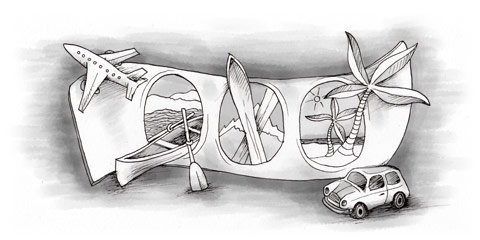Figures were higher before the events of 9/11, but are now gradually rising again. The diversity of leisure opportunities in the UK is enormous and London provides more cultural activities than any other city in the world (some foreigners believe that the UK is a giant theme park). Whatever your favourite leisure interests, you will find them represented in abundance. There’s a profusion of art galleries, museums, gardens, stately homes, zoos, sports facilities, sporting events, children’s entertainment, cinemas, theatres, dance and music events, gambling locales, pubs, restaurants and much more.
The country has many aspects ranging from picturesque country towns and villages to bustling modern cities, all exuding a sense of history to be found in few other countries, and people are drawn to it for many reasons: its rich traditions, quality of live entertainment (particularly in London) and lively arts scene feature prominently. Nowhere provides a more varied and vibrant nightlife for the young (and young at heart) than London, which is besieged by the youth of the world. It’s also home to some of the world’s best (and most expensive) hotels and restaurants.
However, don’t make the mistake of visiting only London and neglecting the UK’s magnificent provincial cities and countryside, where a wealth of historic sites and spectacular natural beauty await you – including fishing villages, national parks, Scottish moors, castles, wild heathland, country inns, charming villages, bleak and rugged mountains, ancient cathedrals, sandy beaches, broads and marshlands. Whether you’re a country or city lover, there’s something for you in the UK. It’s a small country so, no matter where you live, you can regard most of it as your playground. Good road and rail connections ensure that a huge area is accessible for day excursions and practically anywhere is within reach for a weekend trip, particularly if you travel by air. The cost of air travel from the UK to most European countries is reasonable by European standards and is becoming ever cheaper thanks to low-fare airlines; continental weekend breaks are feasible to most destinations, but watch out for airport taxes, which are rising.
Magazines and Newspapers
In most cities, there are magazines and newspapers devoted to entertainment, e.g. Time Out and What’s On in London. Time Out magazine also publishes the Time Out London Visitors’ Guide. Arts and entertainment programmes published at varying frequencies and events information are available from tourist offices in all major centres. Many councils also publish maps and brochures pinpointing local places of interest and leisure facilities. Youth organisations and centres organise a range of activities for young people and children during school holidays, which are often subsidised by local authorities.
Many councils publish free directories listing local sports clubs, leisure facilities, arts and community centres, and opportunities for countryside and outdoor activities. They almost invariably also contain useful information for disabled people. A good source of general tourist information is In Britain, the official bimonthly magazine of Visit Britain (formerly the British Tourist Authority), which contains comprehensive listings of forthcoming events nationwide. Visit Britain also publishes a brochure entitled Forthcoming Events and provides similar information on its website (www.visitbritain.com ). If you wish, it will send you a monthly email newsletter customised to reflect your interests. Other magazines of interest are This England and The Scots Magazine, plus an array of county magazines. Public transport companies publish maps and information leaflets for travellers and most local newspapers include events and entertainment pages. Such information can also be obtained from the television teletext information service and numerous websites.
The main aim of this chapter is to provide information that isn’t found in standard guide books of which there are literally hundreds. Some of the best include the Michelin Green Guide to Britain, Baedeker’s Britain and Fodor’s Britain .
Tourists and day-trippers should take care not to become victims of rip-off prices in tourist areas (particularly in central London) and attractions. If prices aren’t displayed, always ask the price before ordering or buying anything, and check the service charge and other extras in restaurants. For information about sports facilities,.
Tourist Information Centres
There are Tourist Information Centres (TICs) in all major towns and ports, and at principal railway stations and airports; staff can provide you with a wealth of information and book you a hotel room. Centres are signposted by the National Tourist Information sign of a red ‘i’ on a white background and are often housed in public libraries. A search facility on the Visit Britain website (www.visitbritain.com ) brings up the contact details for any of them – just enter the location – and a printed list is available from Visit Britain, Thames Tower, Black’s Road, Hammersmith, London W6 9EL (020-8846 9000), which has also offices in some 20 countries.
TICs have no standard opening hours although 9.30 or 10am to 5 or 5.30pm, Mondays to Saturdays (when they may close an hour earlier) is usual. Later closing times and Sunday opening may operate in summer. In smaller towns, centres may close for lunch, e.g. from 1 to 2pm. Some close from September to Easter or open mornings only in winter, e.g. from November to March. Many rural TICs close from 24th December to 1st January inclusive. Always telephone to check opening hours in advance. An answerphone service often provides this information when centres are closed.
As well as the services mentioned, TICs provide local and regional guides and public transport information; act as box offices for local theatre and concert halls; take bookings for local and city tours, excursions, guided walks and congresses; and arrange car hire or guide services. Most centres will book you a room in any other town which also has a TIC providing the ‘Book-a-Bed-Ahead’ service (for which a fee is charged).
In addition to local TICs, the Britain and London Visitor Centre (1 Regent Street, London SW1Y 4XT) provides similar services for the entire UK. These include, in addition to those mentioned, the booking of sightseeing trips and theatre tickets; a bureau de change and London’s most comprehensive British travel bookshop, stocking over 1,000 different maps and travel guides. Masses of leaflets and brochures covering all areas of the UK, many of which are published by the Scottish, Welsh, Northern Irish and English regional tourist boards, including local events diaries, are also available. You can book a room anywhere in the UK here. Whatever you want to know about travel locally or nationally, the Britain and London Travel Centre will tell you or give you contact details of someone else who can help. Opening hours are 9.30am to 6.30pm Mondays, 9am to 6.30pm Tuesdays to Fridays and 10am to 4pm on Saturdays and Sundays. Saturday opening is extended from mid-May to September and is 9am to 5pm. This is a walk-in operation only and does not take telephone calls.
You may also be interested in the services of VisitLondon, formerly the London Tourist Board (020-7932 2020, uk.visitlondon.com ), which offers a competitive hotel booking service online and by telephone (08456-443 010). It’s also a prime source of information about the capital. London Marketing is a commercial organisation offering a similar service (020-7437 4370, www.londontown.com ) and runs an information kiosk in Leicester Square, which is open from 8am to 11pm. You can also use 450 British Telecom telephone boxes with internet connections to use London Marketing’s services, without paying for the connection. Look for kiosks marked ‘London Town.com – Kiosk Edition’. Among the options immediately facing you on the screen are hotels, tickets, events, maps, and tours. The same organisation also provides a freephone telephone number (0800-566 366) which connects you with an adviser who can answer your queries.
This article is an extract from Living and working in Britain. Click here to get a copy now.


